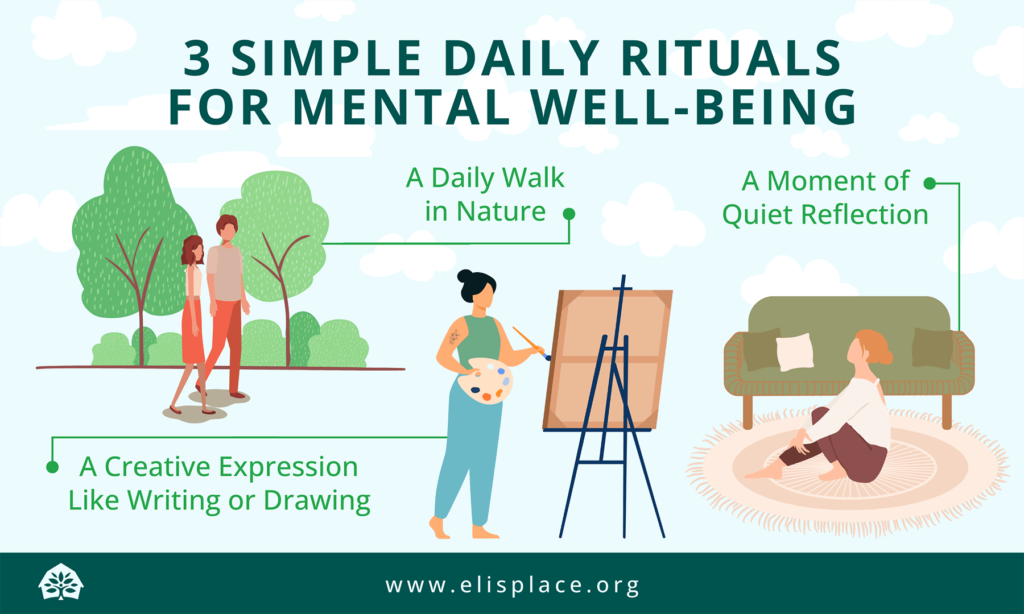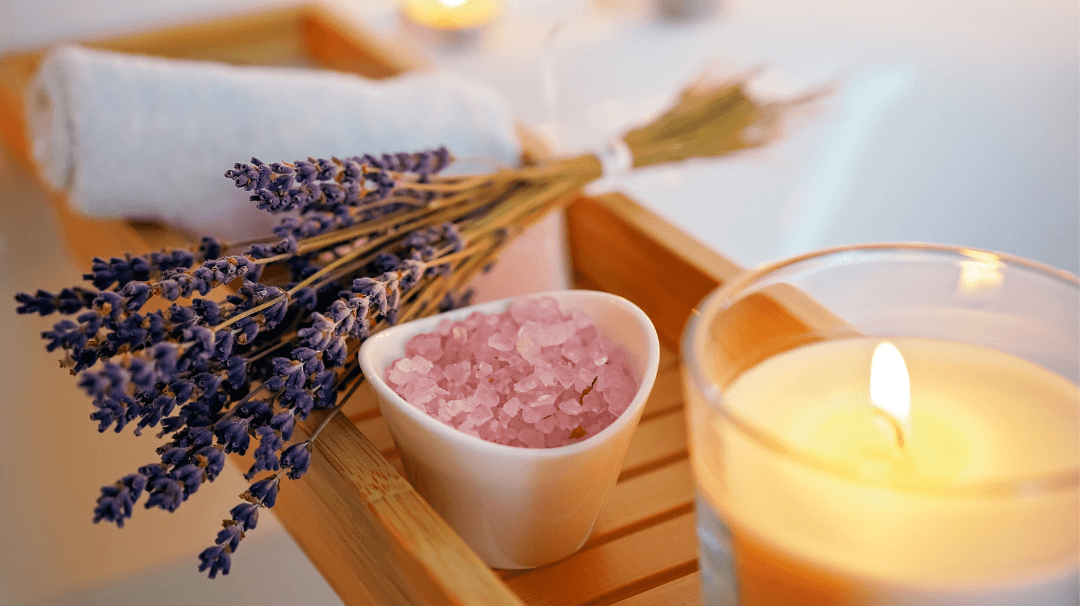Whether rooted in spirituality or derived from secular practices, rituals have a profound impact on mental well-being, providing a sense of structure, meaning, and connection.
Let’s explore the importance of rituals in promoting mental health, delving into both spiritual and secular perspectives, and ultimately guiding readers in creating rituals that work for them.

Ritual or Routine?
A ritual can resemble a routine, but there is one key difference. According to ritualists, the contrast lies in the underlying intention. Individuals may adopt a “routine” with the primary goal of achievement, aligning with the ideals of capitalism, which places importance on productivity – rather than a “ritual” for the purpose of personal gratification or spiritual enrichment.
Or, to swap out the concept of “capitalism” consider that routines typically focus on forward motion, propelling us forward in self-improvement, upward mobility, and better health — in fact, any goal you might set. By contrast, rituals speak to something more ephemeral, something located in the heart or emotions. They tap into a sense of being rather than striving.

Spiritual Rituals: Nourishing the Soul
Spiritual rituals have been an integral part of human history, offering a framework for individuals to connect with something greater than themselves. Regardless of religious affiliation, engaging in spiritual rituals can provide a profound sense of purpose and peace.
Many religious traditions incorporate rituals to foster a connection with the divine. From prayer and meditation to ceremonial rites, these practices offer individuals a designated time and space to reflect, seek solace, and find a sense of transcendence. Studies have shown that regular engagement in spiritual rituals can lower stress levels, reduce symptoms of anxiety and depression, and contribute to an overall improved sense of well-being.
Sometimes the formal, rules-based aspect of religion can get in the way of one’s exploration of religion. As the great Irish poet, theologian and philosopher John O’Donohue put it: we shouldn’t let issues with the structure of organized religion stop us from seeking a connection with a higher power. Seeking connection with the divine, however one defines it, can be very fulfilling for our mental well-being.
Furthermore, spiritual rituals often involve a sense of community, whether it be attending religious services or participating in group ceremonies. This communal aspect not only enhances the feeling of belonging, but also creates a support network that can be invaluable during challenging times. The shared experience of ritualistic practices fosters a sense of unity and shared purpose, contributing to mental resilience.

Secular Rituals: Creating Stability in a Fast-Paced World
For those who may not identify with a specific religious tradition, secular rituals offer an alternative path to mental well-being. These rituals are rooted in the everyday, providing a means for individuals to ground themselves amidst the hustle and bustle of modern life.
Secular rituals can take various forms, from morning routines and mindful practices to creating personal ceremonies that hold significance. The key is to establish a sense of structure and predictability in daily life. For example, a morning ritual of journaling, practicing gratitude, or engaging in mindful breathing exercises can set a positive tone for the day ahead, grounding one’s mind.
Research suggests that incorporating secular rituals into one’s routine can improve mental health by reducing stress, increasing mindfulness, and fostering a greater sense of control over one’s life. In a world filled with uncertainty, these rituals serve as anchors, providing a steady foundation upon which individuals can build emotional resilience.

Creating What Works for You
While spiritual and secular rituals each offer unique benefits, the most effective rituals are often personalized and resonate with the individual. Creating a ritual that works for you involves a thoughtful exploration of your values, beliefs, and preferences.
Begin by reflecting on what brings you a sense of peace, joy, or fulfillment. Consider activities that ground you and make you feel connected to yourself and the world around you. It could be as simple as a daily walk in nature, a moment of quiet reflection, or a creative expression like writing or drawing.

Experiment with different practices and be open to adjusting them based on what feels most authentic and sustainable for you. The key is consistency — incorporating these rituals into your daily or weekly routine to establish a sense of continuity and stability.
Again, be mindful of the intention behind your rituals. Whether you seek solace, inspiration, or connection, understanding the purpose of your chosen practices adds depth and meaning to your mental health journey. This self-awareness can enhance the positive impact of your rituals and contribute to a more profound sense of well-being.

Fostering a Healthy Mind
The importance of rituals in promoting mental health cannot be overstated. Whether drawn from spiritual traditions or developed through secular practices, rituals offer a valuable tool for navigating the complexities of modern life. By incorporating personalized rituals into daily routines, individuals can cultivate a sense of stability, purpose, and connection, ultimately contributing to a healthier and more resilient mind.
Eli’s Place will be a rural, residential treatment program for young adults with serious mental illness. To learn more about our mission and our proven-effective model click here.




